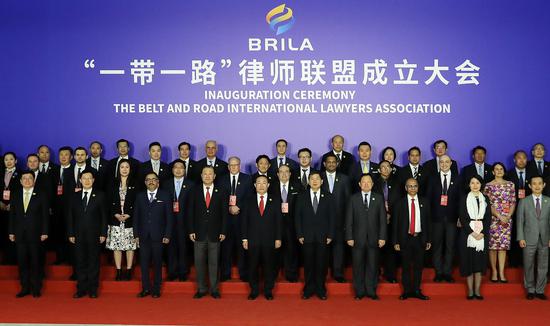
Former Malaysian prime minister Najib Razak.
The body overseen by Chief Justice Tom Bathurst responsible for deciding who can practise law in NSW relied on a wildly defamatory Malaysian blog depicting ABC journalists, former British prime minister Tony Blair, financier George Soros and others as part of a global conspiracy when deciding to deny a would-be solicitor a certificate to practise.
Chief Justice Bathurst and Legal Practitioner Admission Board executive officer Louise Pritchard declined to answer The Australian’s questions about how the article came into the board’s hands and why its members felt the conspiracy-laden material could be relied upon as part of a decision to deny Sydney man Ganesh Sahathevan admission as a lawyer. Nor would either say which of the 10 members of the LPAB, three of whom are serving NSW Supreme Court judges, was on the deciding panel.
Ms Pritchard has left her role at the LPAB since The Australian began making inquiries in September. The article, published in December 2017 on website The Third Force, accuses Mr Sahathevan of engaging in a conspiracy to attack then Malaysian prime minister Najib Razak.
Mahathir Mohamad, who returned as prime minister after toppling Mr Najib in elections held last May, is also smeared as a participant in the globe-spanning conspiracy.
Mr Najib was under pressure at the time over the country’s sovereign wealth fund, 1MDB, which the US Department of Justice says has been looted of billions of dollars that was spent on property, art, jewels and the Leonardo DiCaprio film, The Wolf of Wall Street.
Malaysian authorities have charged Mr Najib with dozens of corruption offences that could attract decades in jail over his role in the 1MDB scandal, which allegedly included the flow of about $US1 billion through his personal bank account.
The article’s author, Malaysian political operative and Najib loyalist Raggie Jessy, also accused Rewcastle-Brown, Stein and Besser of receiving money, totalling millions of dollars, to participate in a Four Corners program exposing the 1MDB scandal that aired on the ABC in March 2016.
There is no suggestion any of Mr Jessy’s
bizarre allegations are true. However, the LPAB cited the piece when denying Mr Sahathevan admission as a lawyer in an undated and unsigned set of reasons sent to him on August 3 last year.
It used the article as evidence in a passage dealing with legal conflicts between Mr Sahathevan, who has largely worked in the past as a journalist, his former employer, Malaysia’s Sun Media Group, and the company’s owner, tycoon Vincent Tan.
In that context, the board said the Third Force article reported “that Mr Sahathevan was investigated for blackmail, extortion, bribery and defamation”. While the article claims that blackmail, extortion, bribery and defamation “are but some of the transgressions many from around the world attribute” to Mr Sahathevan, The Australian was unable to find any reference in it to an investigation into him on these grounds.
It is unclear why the board felt the need to rely on the article, as it also made adverse findings about Mr Sahathevan’s character based on a series of other allegations including that he used “threatening and intimidating” language in emails to the College of Law and the NSW Attorney General and did not disclose his sacking from a previous job to the board.
Mr Sahathevan has denied the allegations in correspondence with the board.
The board also cited evidence that one of Mr Sahathevan’s blogs on Malaysian politics was banned by the Najib regime as indicating his poor character.
In an email to Chief Justice Bathurst, sent on August 30, Rewcastle-Brown said her site, Sarawak Report, which exposed much of the 1MDB scandal, was banned by the Malaysian government.
“I along with other critics of the 1MDB scandal (which includes Mr Sahathevan) became the target of immense state-backed vilification, intimidation and online defamation campaigns on behalf of the Malaysian government,” she said.
She said the board’s use of the Third Force article against Mr Sahathevan displayed “a troubling level of misjudgment and poor quality research, giving a strong impression that someone seeking to find reasons to disqualify this candidate simply went through the internet looking for ‘dirt’ against him”.
“The Third Force has consistently been by far the most outlandish, libellous, vicious and frankly ludicrous of all the publications that were commissioned as part of former prime minister Najib Razak’s self-proclaimed ‘cyber army’ which he paid (and continues to pay) to defame his perceived enemies and critics,” she said.
Besser, who now works in the ABC’s London bureau, told The Australian: “It’s clearly nonsense and comes from the darkest corners of some pretty wild Malaysian conspiracy theorists.”
Mr Sahathevan’s application is to be reconsidered at an LPAB meeting next month (Admission has since been denied, for the same reasons, but without explicit reference to the Thirdforce story).
BUSINESS REPORTER
Business reporter Ben Butler has covered everything from tractors to fashion to corporate collapses. He has previously worked for the Herald Sun and as a senior business reporter with The Age and Sydney Morning...
Read more






